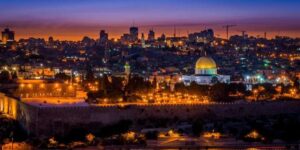The Peace of Jerusalem
God’s will for Jerusalem is that it be whole—undivided.
Without question Israel, and its capital city, Jerusalem, are of paramount importance in the plans and purposes of God. And we know God uses believers to work with Him in prayer for the carrying out of His plans, His mysteries, on the earth (see 1 Cor. 14:2).
That’s why He commands us to “pray for the peace of Jerusalem” (Ps. 122:6, NKJV). But this does not mean we are to pray simply for the absence of war. It also means we are to pray for Jerusalem to fulfill its prophetic destiny.
Understanding the word “peace” is a key to understanding this command. The Hebrew word for peace is shalom. The root word for shalom is shalem, which means “whole.” Shalom therefore means the peace that comes from being whole. God’s will for Jerusalem is that it be whole—undivided. But 11 years ago the Israeli government was leaning toward dividing the land and eventually, Jerusalem. So we took a group to Israel to pray about the upcoming elections.
I contacted Jewish friends who own a hotel in Ariel. They had known us for years and believed we were being sent to pray. “You have to pray at Alon Moreh,” they insisted.
They believe that God first appeared in the land and promised it to Abraham at a place called Alon Moreh (see Gen. 12:6-7). The King James Version calls it “the plain of Moreh.” Other translations call it the terebinth, or oak tree of Moreh. Alon is the Hebrew word for “oak tree.”
Our friends took us by bus, by jeep and then on a long hike up a mountain to a lone oak tree where they believe God appeared and spoke. Called by the Jews the “Mountain of Abraham,” its wide overlook includes Shechem (Nablus), the Mountain of Blessing (Gerizim) and the Mountain of Cursing (Ebal). Pilgrims have been coming here for centuries.
The first time I took a group to pray there, we were met with a special anointing. After praying, we came down the mountain and drove up to Jerusalem, where we watched election returns late into the night. It looked as though the party favoring division had won.
In fact, the morning edition of The Jerusalem Post headlined that party as the winner. But a lengthy count revealed it had not won after all. Our prayers had a powerful effect.
Whenever I take prayer groups to Israel, I instruct them to pray as Hannah prayed when they walk the Holy Land. She prayed almost silently. Yet she was the first to call on God as the Lord of hosts (see 1 Sam. 1:11).
Her prayers also had a powerful result. Hannah’s prophetic thanksgiving and praise declares that she bore seven children (see 1 Sam. 2:5). Elsewhere in the Bible we read that she had only six natural children (see v. 21).
So who was the seventh? He was the Messiah, the Anointed One (see v. 10). Hannah’s prayers not only gave birth to the prophet Samuel but also, in a spiritual sense, birthed the Messiah.
In addition to praying at Alon Moreh, we usually go to the Dome of the Rock, which is on a hill in Jerusalem called Moriah, or the Temple Mount. It is a sacred place because it is here that Abraham prepared to offer up Isaac. Yet visitors are forbidden to pray on this spot.
We always pray nevertheless—but silently. Or we pray in tongues quietly while acting as if we are talking to each other. It is a perfect place to pray for the peace of Jerusalem—and help bring about the fulfillment of the plans of God for this city and His people, Israel.
Billye Brim is a gifted Bible teacher and intercessor who directs the Prayer Mountain in the Ozarks in Branson, Missouri. Author of numerous books, she also leads prayer and study groups to Israel. Go to billyebrim.com.






































